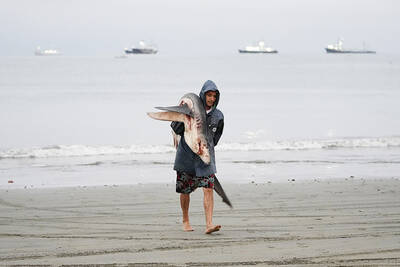At first glance, the Souq Waqif clinic in the center of Doha could be any other state-of-the-art hospital.
Nurses in blue scrubs move briskly through the bright wards, conducting rounds. Radiology and operating rooms whir with the beeps and blinks of monitors. Specialists squint at X-rays and masked doctors make incisions with all the high-tech tools of modern surgery on hand.
There is just one thing: The rooms are filled with falcons.

Photo: AP
In the tiny, wealthy emirate of Qatar, the desert birds are among the nation’s most pampered residents.
Long revered across the Arabian Peninsula for their ferocity and hunting prowess, falcons today serve as sheikhly status symbols recalling a Bedouin past.
The bond between falconers and their falcons has been an inspiration since the Paleolithic period, when drawings of the creatures first appeared on cave walls.
Although less fashionable now than in the past, the art of falconry is still passed down from one generation to the next in Qatar and other oil-rich sheikhdoms of the Persian Gulf. With demand growing in the past few years, clubs that teach the sport have sprouted up across the region.
Falcons compete in an increasing number of races and beauty contests.
The finest falcons fetch at least a few thousand dollars and Qataris spare no expense to maintain their good health.
“The establishment of the hospital was to support the hobby and heritage of raising falcons... It’s a pastime that stretches its veins into multiple generations,” Souq Waqif hospital director Ikdam al-Karkhi told reporters. “Keeping them alive and well is an essential duty.”
Public hospitals such as Souq Waqif offer expert care to sick and wounded hawks, roughly 30,000 a year. The marbled reception area bustles with owners and handlers bringing their birds in for checkups, medical tests, feather replacements, orthopedic surgeries — and even something akin to mani-pedis.
Falcon nail filing is a serious business, as birds transplanted from the desert to opulent homes in skyscraper-studded Doha or bred in captivity cannot easily find sharp surfaces on which to trim their talons.
The falcon’s hunt might be a long-venerated tradition, but it is also grisly work.
The cornered prey at times puts up a fight, clawing an attacking falcon and hobbling its wings. Each of a falcon’s feathers is vital to its flight, necessitating careful feather replacement after a scuffle.
Doctors pull from a bank of shed feathers to find one that perfectly matches the wounded bird’s breed — plumage of the same pattern, length and color.
“If these damaged feathers remain, it can cause loss or reduction of the bird’s fitness,” al-Karkhi said. “They must be treated.”
Hospital surgeons treat other casualties of the hunt, too. Falcons’ beaks and talons sustain damage from all that swooping and plunging and gobbling.
In the clinic waiting room, falcons perch regally on their owners’ gloved wrists. The Qatari men in their flowing white robes stroke their feathers and mist their beaks with water.
“If a person is neglecting their bird, it’s a huge problem,” said Hamad al-Mehshadi, a falcon festival manager taking his raptor for a regular medical checkup. “When one holds onto their bird, it is something else. The love of the bird is extraordinary.”
Souq Waqif still sees a steady stream of 150 falcons a day — a sign that the echoes of Qatar’s ancient past are not lost.
“Even the look that a falcon and its owner share, it’s different than any other look,” al-Karkhi said. Falconers “feel the loyalty of this bird — a fierce warrior in the wild and yet a pet in my hand.”

WAKE-UP CALL: Firms in the private sector were not taking basic precautions, despite the cyberthreats from China and Russia, a US cybersecurity official said A ninth US telecom firm has been confirmed to have been hacked as part of a sprawling Chinese espionage campaign that gave officials in Beijing access to private texts and telephone conversations of an unknown number of Americans, a top White House official said on Friday. Officials from the administration of US President Joe Biden this month said that at least eight telecommunications companies, as well as dozens of nations, had been affected by the Chinese hacking blitz known as Salt Typhoon. US Deputy National Security Adviser for Cyber and Emerging Technologies Anne Neuberger on Friday told reporters that a ninth victim

Russia and Ukraine have exchanged prisoners of war in the latest such swap that saw the release of hundreds of captives and was brokered with the help of the United Arab Emirates (UAE), officials said on Monday. Ukrainian President Volodymyr Zelenskiy said that 189 Ukrainian prisoners, including military personnel, border guards and national guards — along with two civilians — were freed. He thanked the UAE for helping negotiate the exchange. The Russian Ministry of Defense said that 150 Russian troops were freed from captivity as part of the exchange in which each side released 150 people. The reason for the discrepancy in numbers

A shark attack off Egypt’s Red Sea coast killed a tourist and injured another, authorities said on Sunday, with an Italian Ministry of Foreign Affairs source identifying both as Italian nationals. “Two foreigners were attacked by a shark in the northern Marsa Alam area, which led to the injury of one and the death of the other,” the Egyptian Ministry of Environment said in a statement. A source at the Italian foreign ministry said that the man killed was a 48-year-old resident of Rome. The injured man was 69 years old. They were both taken to hospital in Port Ghalib, about 50km north

MISSING: Prosecutors urged the company to move workers out of poor living conditions to hotels, but residents said many workers had already left the town Brazil has stopped issuing temporary work visas for BYD, the Brazilian Ministry of Foreign Affairs said on Friday, in the wake of accusations that some workers at a site owned by the Chinese electric vehicle producer had been victims of human trafficking. The announcement came days after labor authorities said they found 163 Chinese workers who had been brought to Brazil irregularly in “slavery-like” conditions at the BYD factory construction site in the northeastern state of Bahia. The workers were employed by contractor Jinjiang Group, which has denied any wrongdoing. Later, the authorities also said the workers were victims of human trafficking,